Music is an integral part of our being, and scientists are still studying the link between music and language. The music we create has been with us for many millennia, but natural music in itself has been in existence long before we have.
The sounds of nature, white noise, is something we gladly put into our ears, and many of these recordings seem to just sound so much better, clearer when we listen to them through headphones. In fact, many new recordings recommend that you should listen to them with headphones on for the 8D effect.
There are two reasons why music sounds better with headphones. First, as the source is closer, less sound is lost, and we hear more of it. It sounds better because more of the music reaches our eardrum. Next, headphones cut out background noise, helping us to focus on the music.
Music has an important cultural significance to people, and scientifically it can really have a great effect on our mood. To make the most of these benefits, let’s dive a bit deeper into the science behind why it sounds better, and which type of stereo is actually best e.g. headphones, earbuds, wireless or speakers.

Why Does Music Sound Better with Headphones?
There has to be some science behind the reason why music sounds better coming from headphones. At least practically, we know it sounds better. Otherwise, music producers and artists wouldn’t use them.
1- Proximity
Music does sound different through headphones for most people. Physics dictates that when soundwaves are closer to the input device (eardrums or microphone), the quality will be better.
Secondly, the sound quality is better when other sound waves are excluded through noise-cancellation.
2- Noise-cancellation
There are two types of noise-cancellation. Active noise-cancellation is where the headphones or earbuds reduce external sounds by canceling the sound waves.
Then there is passive noise-cancellation that blocks external sound physically. More often, earbuds will use passive noise-cancellation while headphones use active or passive.
This is one reason why audio sounds better when using headphones because you’re cutting out all the noise.
3- Brain Interpretation
Is there any science behind how the brain receives sound coming from headphones vs. ambient sound? How do they do those cool 8D sound effects? Turns out, your brain is all about timing.
If a sound comes from a certain direction, the ear on that side will receive the sound first, and your brain will then register that the sound is coming from the left or right.
The same can be engineered into audio files that are heard through headphones. And, yes, you can only get these effects with headphones (or earbuds) because they have a left and a right speaker, but this is not the reason why your headphones are louder on one side.
4- Sound Staging
This brings us to the next point, by understanding how the brain interprets sound, our audiophile sound engineers have been able to reconstruct sound in ways only possible with headphones.
Sound staging is the process of replicating spatial sound to mimic not only left and right, but also distance.
This is where things get really cool, and if you haven’t listened to an audio recording that has been engineered for sound staging, please do.

What Happens to Your Brain When Listening to Music?
If you’ve ever just immersed yourself if listening to music with your headphones on, you know that something happens to your brain. It’s like everything else disappears, and you’re in nirvana (thank you, Kurt).
So, what’s happening? Why am I so much happier when I have my headphones jamming away, why are there people who claim to get the “tingles” when they listen to ASMR through their headphones, what the hell is going on with the brain?
Well, it turns out that music triggers our pleasure centers (that sounds way too sexy – think happy centers). These are neurotransmitters that up your happiness enzymes and reactions like triggering the release of Dopamine (yes, please).
Ever just feel a surge of happiness as you start putting on your headphones, and you know exactly which song you’re going to blast into your ears? That feel good – I can do anything jam. Yip, that’s your brain too… It can anticipate the feeling you get from your favorite music and reward you with an early dopamine treat. Thank you, brain.
What’s more, it turns out that listening to music can do more than just make you happy; it also keeps you healthy.
A study published in Stress Medicine concluded that the mental and emotional benefits obtained from listening to your favorite music have a direct positive effect on your immune system and overall health.
As we all know, a healthy immune system protects against viruses and bacteria and keeps you strong – that’s pretty amazing considering that it’s just feel-good sounds that have this effect.
Researchers have used this powerful knowledge to treat everything from depression to Parkinson’s disease.
If you have children, you might also want to consider the role that music can play in their development.
Music has a strong correlation to things like language development and even overall brain development. Seems playing Beethoven isn’t such a bad idea when studying with headphones on.
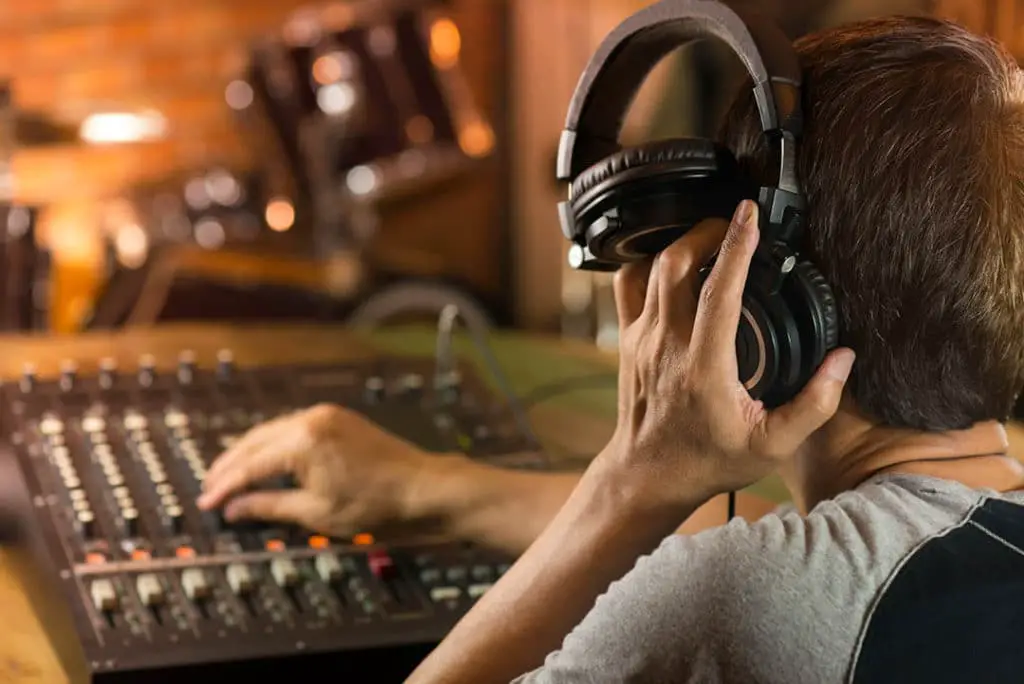
Is It Actually Better to Listen to Music with Headphones?
There are some who practically live with headphones on and others who walk with a speaker on the shoulder? Who’s right, and is it really actually better to listen to music through headphones? There are a few things to consider.
1- What Is Your Goal?
If you want to listen to music or a podcast with crystal clear sound, you won’t go wrong with headphones.
They offer better audio than speakers because they deliver it directly to your ears. The sound doesn’t have to compete with other sounds in the room.
However, if you’re a sound engineer and you’re trying to actually listen to a recording or reproduce a sound, you’ll, unfortunately, need both.
Because headphones are, well, basically perfect, they don’t give an idea of what something will sound like when playing in a room. To get the acoustics perfect, sound engineers will often resort to using speakers.
Even though headphones are, in many ways, the best device for listening to music, speakers recreate reality better. With headphones, you’ll hear every sound, but if you’re going to play the audio at any stage to an audience, you need to test the sound through speakers.
2- Volume Control
This one is going to sound like a stern warning from your mother, but so be it. Most people crank up the volume way too much when using headphones – often without realizing it.
Because they’re so close to your ears, you really need to be careful. It’s estimated that we use volumes 25%-50% louder on headphones when compared to speakers.
That’s a lot actually, and yes, it can be quite detrimental to your hearing, especially as it’s continuous – the music doesn’t stay in the other room when you head to the kitchen, it comes with.
To give you an idea, most headphones can reach over 100 dB easily – so that’s you blasting away your favorite song.
However, you can actually damage your hearing at around 80 dB, especially when you’re listening for extended periods.
To put this into perspective, the noise level your lawnmower generates is around 96 dB, so when you mow the lawn and listen to music (louder than the lawnmower – because you’re not using the best noise-canceling headphones for mowing the lawn) you’re definitely over the safety limit.
3- Overall Audio Experience
Headphones are great, but they can only do so much. Because they’re close to your ears, they need to be safe to use.
So, the bass is usually lacking. Yes, there are a few models that offer exceptional bass, but to really feel the music, a set of speakers and an amp will go a long way.
In the end, it really depends on what you want and what you care about. If it’s all about personal audio quality, headphones are for you, but if you’re a recording artist or a sound engineer, you might want to invest in both.
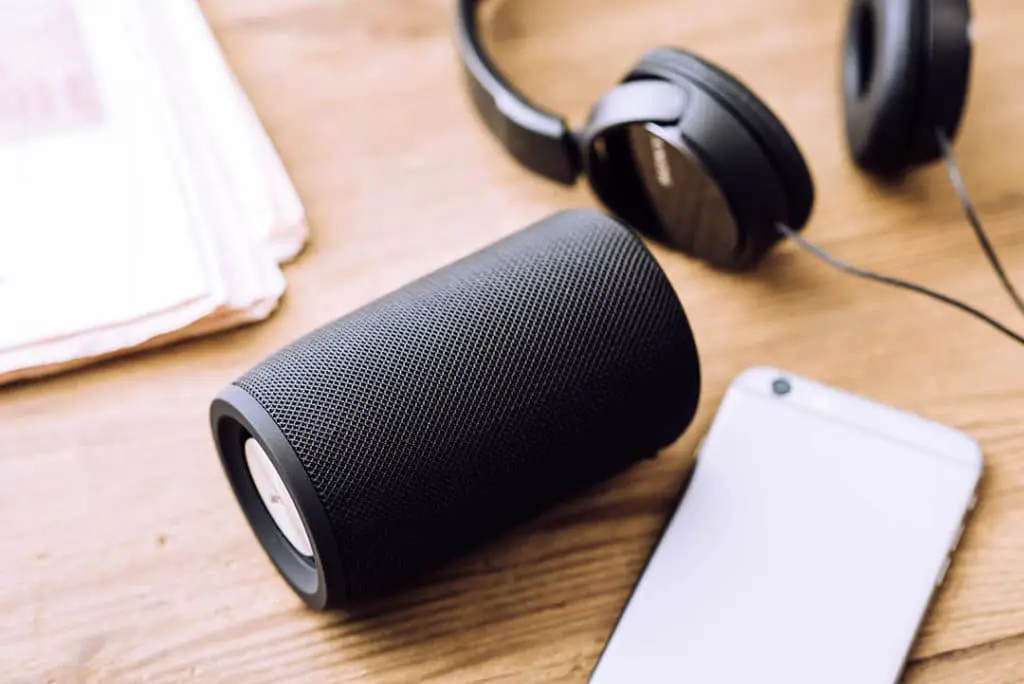
How Do Audio Devices Compare?
There are some big differences between the various audio devices. Let’s take a look at each by comparing their strengths and weaknesses to get you the perfect fit for your sound experience.
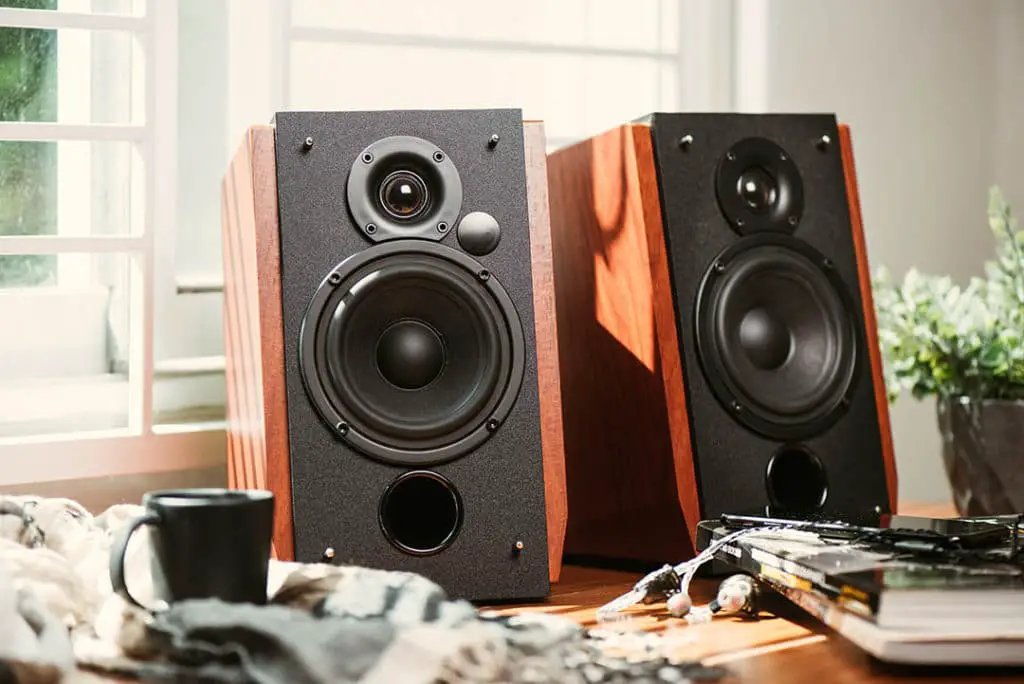
1- Headphones vs. Speakers
Headphones deliver more accurate sound because the speaker is closer to the ear. The design of the driver doesn’t need to be as specialized as it doesn’t need to carry the sound across a room. Box speakers offer better acoustics and are designed to carry sound over a space to your ears.
It doesn’t mean that any quality is lost in headphones; in fact, many headphone speakers pack more bang for their buck.
Speakers, on the contrary, are great for sharing audio in a space. We’ve become so accustomed to having speakers available, on your phone, laptop, desktop computer, but often we don’t use them because we want our audio to be private.
However, sometimes you actually do want to share the experience, like at a party, and that’s when dedicated, quality speakers are valued.
If you’ve ever been at a party where someone was trying to play tunes off their laptop, you know what I’m talking about, it just doesn’t cut it.
Speakers are actually quite the engineering feat. They house multiple drivers, and the engineers need to take into consideration the overall space it’s designed for, the crossovers, box resonance, etc.
So, while headphones offer more accurate sound, and are great for personal use, speakers are all about the experience.
However, to get good speakers will probably cost a fair bit, compared to the average price of exceptional high-quality headphones, the real value for money lies with headphones.
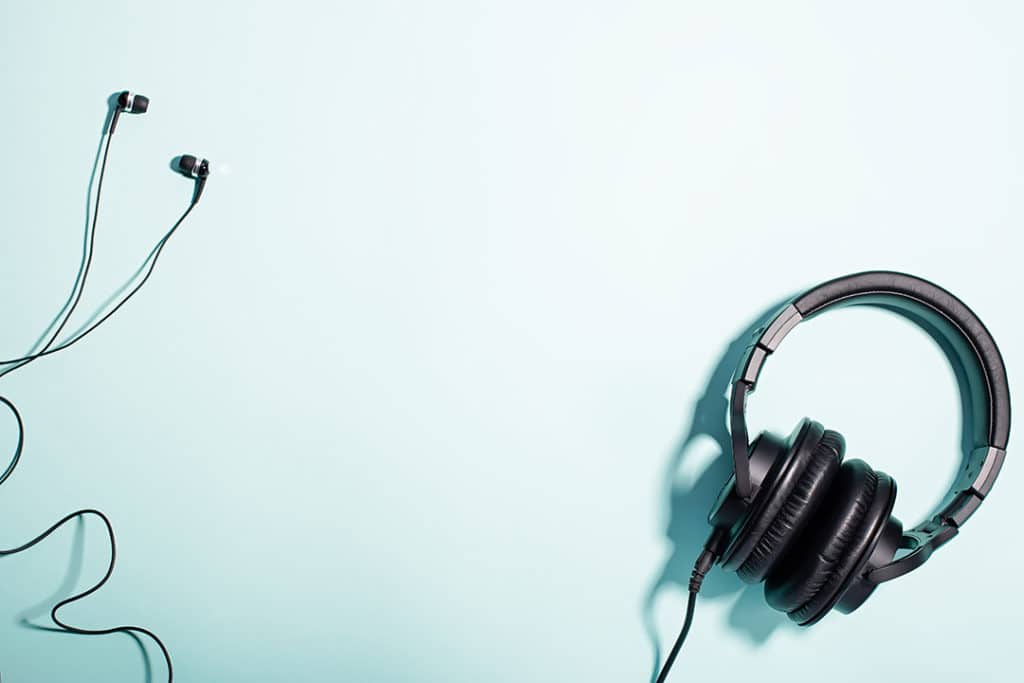
2- Headphones vs. Earbuds
Headphones offer overall better sound quality when compared to earbuds. This is because headphones sit over the ear, offering some space for acoustics. Over-the-ear headphones are larger with bigger drivers and allow for more air to flow through, offering a richer sound and often some bass.
While there is nothing wrong with earbuds and the Airpods Pro really do pack a punch, any audiophile will go for headphones when it comes to audio quality. Headphones are bigger and can thus house a much larger driver.
The difference between a headphone’s 40mm-to-50mm driver and the sound produced is undoubtedly better than the sound produced by the earbuds 7mm-15mm driver. Size isn’t everything (check out my article on headphone driver size), but a little does go a long way.
When you consider how close the earbuds speaker is to your eardrum, it’s also wise to not pump the volume up too high, especially as there’s no escape.
However, with headphones, there is more airflow through, and thus it can handle a bit of volume and benefit from smoother, richer, bassier sounds.
Headphones will give that bit of punch, and they really can be used anywhere doing anything, while earbuds are less conspicuous and offer a sleek look for those who need it. In my opinion, you need both anyway.
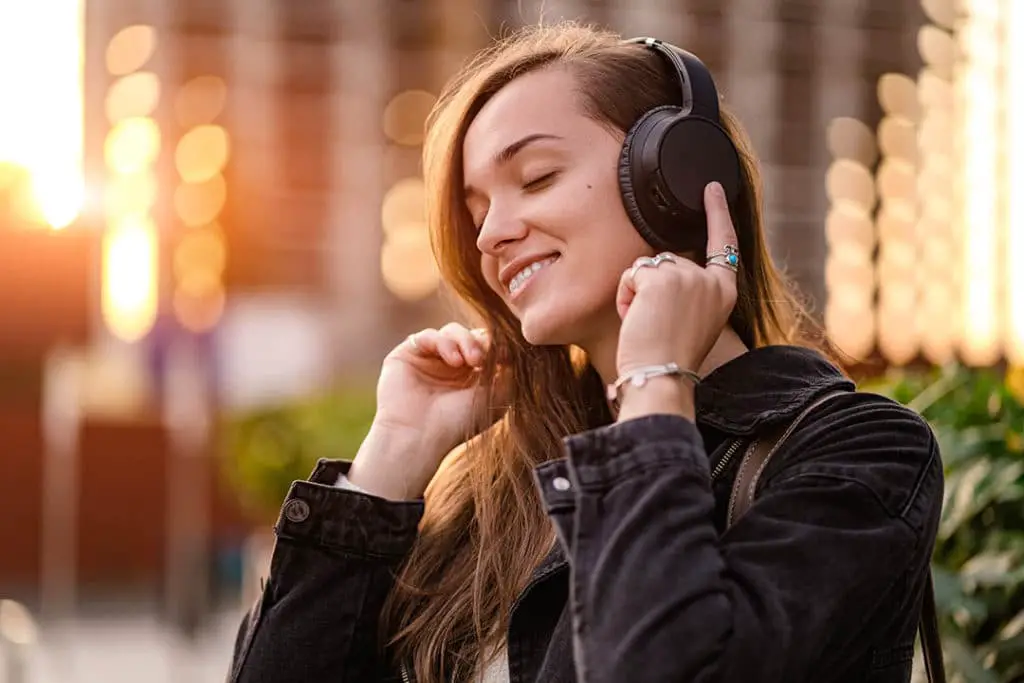
3- Wired vs. Wireless Headphones – Which Sound Better?
Is there actually a difference in sound quality when it comes to wired vs. wireless headphones? Turns out, there is a chance that one could offer a slightly better audio experience (and I’m not just referring to the audio cutting out on a poor wireless).
Wired headphones offer better sound quality than wireless. While the type of audio file could determine if you notice the difference (no difference on MP3, bigger difference on ALAC/FLAC/WAV), there is also the fact that wired headphones get the audio signal to the driver without losing any data.
That isn’t to say that top quality wireless headphones can’t outperform wired headphones, so this definitely isn’t a rule.
Just make sure that if both quality audio and wireless are equally important to you, that you opt for the best.
As a summary
Audio is generally cleaner and clearer when played through headphones. However, quality speakers, surround sound, and earbuds can all offer an exceptional audio experience. However, each audio device has its own unique qualities to consider when choosing.

